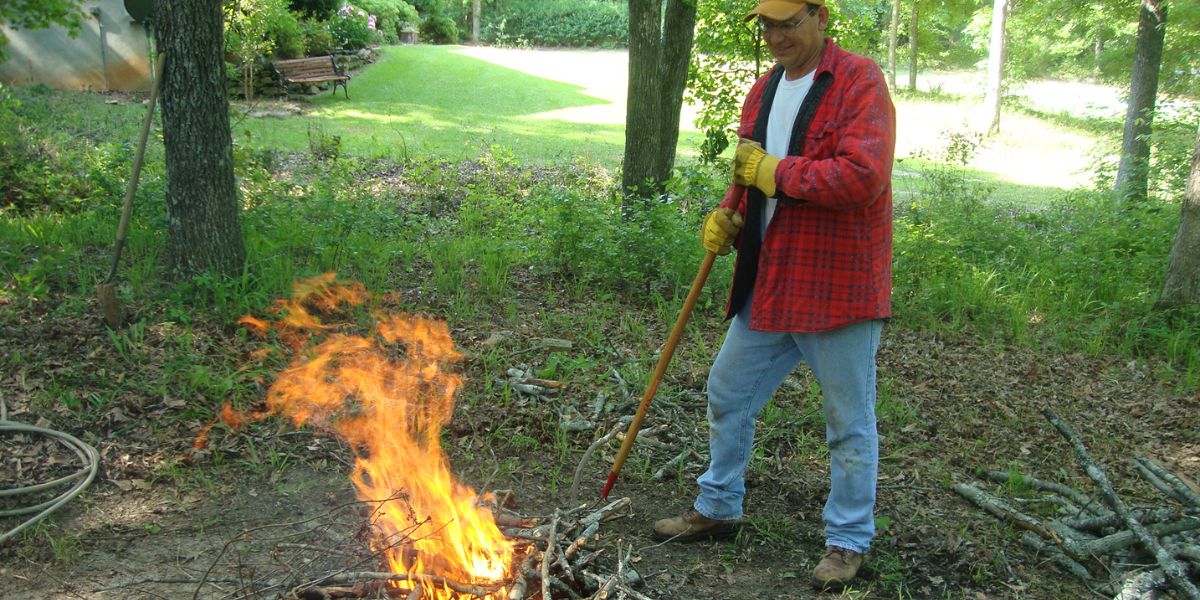In Georgia, burning on your property is a common way to manage rubbish and yard waste. However, it is also subject to a series of restrictions that are designed to promote safety and avoid wildfires.
Landowners and homeowners who want to burn safely and lawfully need to understand Georgia’s fire laws. This is a guide that explains the regulations and limitations of burning in the state of Georgia.
Burning Methods Permitted in Georgia
Open burning is allowed in Georgia for specific reasons, such as:
- Burning Yard Waste: You can burn natural yard waste such as leaves and branches. This is particularly prevalent in rural areas or locations where there are restrictions on local trash disposal.
- Agricultural Burning: Farmers and landowners have the option of burning agricultural waste, which includes stubble, weeds, and brush that result from farming or forestry activity. However, they must adhere to certain regulations in order to keep the fire under control.
- Fire Pit or Campfire: Small outdoor fires that are controlled and used for recreation, such as those in fire pits, are normally allowed as long as you follow local safety rules and employ sufficient containment.
Even with these exceptions, the law forbids the burning of certain materials, such as:
- Household garbage (plastic, chemicals, treated wood, etc.)
- Tires
- Dangerous materials (such as paint, oils, and solvents)
- Waste from construction and demolition
If you burn these goods, you could face hefty fines since they discharge dangerous toxins into the air.
Is a permit required for burning?
In Georgia, permits are typically necessary for larger open burns. If you intend to burn a considerable amount of debris, particularly for agricultural or forestry purposes, you must first obtain a burn authorization from the Georgia Forestry Commission (GFC).
The commission is responsible for issuing permits for agricultural burning and land clearance operations. These licenses serve to guarantee that burns are performed in a safe manner and in accordance with state legislation.
Permits are not needed for recreational fires such as campfires or fire pits. However, you should always check with your local fire department or municipal office to see whether there are any additional local rules or restrictions in your area.
Burn Bans and Seasonal Restrictions
To reduce the risk of wildfires, especially during dry seasons, Georgia has implemented restrictions on seasonal burning.
1. Times When Burning is Not Allowed:
Georgia usually has a burn ban in place during particular months, often from May 1 to September 30. These months are when the risk of wildfires is highest because of dry conditions.
2. Limited Hours:
Burning is only allowed at certain hours at particular periods of the year, such as during the burn ban. For instance, agricultural burning may only be permitted in the early morning or late afternoon in order to reduce the risk of fire.
3. Weather Conditions:
Outdoor burning is frequently not allowed on days with strong winds, dry conditions, or extreme heat, even when there is no burn restriction in effect. The GFC keeps an eye on fire danger levels and may impose temporary burn restrictions when the situation is especially dangerous.
Safety Procedures and Recommended Practices
If you are legally permitted to burn, it is important to take precautions to ensure that your fire stays under control:
- Clear the Area: Make sure there is a 10-foot buffer surrounding the burn area to stop the fire from spreading to nearby plants or buildings.
- Keep an eye on the fire: Always stay with a fire that is burning. Make sure to have a hose, shovel, or fire extinguisher close by in case the fire goes out of control.
- Put Out the Fire entirely: After you are done burning, make sure that the fire is entirely out by pouring water on it and stirring it to check that there are no remaining embers.
Tennessee Fire Regulations: Is It Legal to Burn on Your Own Property?
Consequences for Burning Illegally
If you break Georgia’s open burning regulations, you might face large penalties and possibly even criminal prosecution. The following are possible penalties for unauthorized burning:
- Unauthorized burns can result in fines of up to $500.
- Responsibility for the damage caused by the fire
- Criminal charges for negligence or reckless burning
If you start a wildfire because you are not following correct burning methods, you could be held financially accountable for the costs of fighting the fire and for any damage to property.
Maryland Fire Regulations: Is It Legal to Burn on Your Own Property?
Other Options Besides Open Burning
Here are some alternatives if you are not comfortable with open burning or if you would rather use an environmentally friendly option:
- Composting: Rather than burning leaves and grass clippings, think about composting them instead.
- Yard Waste Pickup: A number of local governments provide services for the collection of yard waste.
- Mulching: You can use brush or branches as mulch in your garden.
Final Thoughts
In Georgia, you are allowed to burn certain materials on your property, but it is important to follow the state’s fire laws in order to stay safe and avoid fines.
For the most current information regarding fire permits, limits, and safety measures, always consult the Georgia Forestry Commission or local authorities. You may securely maintain your property and reduce the risk of wildfires by following the rules.








